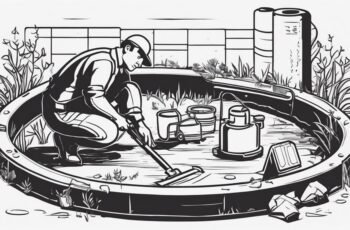Maintaining your septic tank is like tending to a well-oiled machine – it requires attention to keep things running smoothly.
With a few simple yet effective strategies, you can ensure that your septic system remains in top-notch condition, saving you both time and money in the long run.
By implementing some practical tips and tricks, you can prevent costly repairs and ensure the longevity of your septic tank.
Want to learn how to avoid common pitfalls and keep your septic system operating efficiently?
Key Takeaways
- Regular pumping every 3-5 years is crucial for septic system longevity.
- Implement water conservation practices to maintain system efficiency.
- Opt for proper waste disposal methods to reduce strain on the system.
- Stay proactive with DIY inspections and maintenance for optimal functioning.
Understanding Your Septic System

To ensure proper maintenance, you must understand the components and functioning of your septic system. Your septic system consists of a septic tank, a distribution box, and a drain field. The septic tank is where the initial treatment of wastewater occurs. Solids settle at the bottom forming sludge, while lighter materials like oil and grease float to the top as scum. The clarified liquid flows out to the distribution box, which evenly distributes it to the drain field for further treatment.
Understanding these components is crucial for maintaining your septic system's efficiency. Regular inspection and maintenance prevent issues such as clogs, backups, and system failure. By being aware of how your septic system works, you can detect early signs of problems and address them promptly. Proper maintenance ensures the longevity and effectiveness of your septic system, saving you from costly repairs and replacements.
Take the time to learn about your septic system's components and the importance of regular maintenance to keep it running smoothly.
Regular Pumping Schedule
Maintaining a regular pumping schedule is essential for the proper functioning of your septic system. The pumping frequency of your septic tank depends on several factors such as the size of your household, the tank size, and your water usage habits.
As a general guideline, it's recommended to have your septic tank pumped every 3 to 5 years. However, if you have a larger household or notice any signs of a full tank like slow drains or odors, you may need more frequent pumping.
Water Conservation Practices

Conserving water is crucial for the efficient operation of your septic system. By reducing water usage, you can prevent overloading the system and keep it functioning properly.
One way to conserve water is through rainwater harvesting. Collecting rainwater can help lower your overall water consumption, easing the burden on your septic tank.
Additionally, being mindful of leaks in your plumbing system is essential. Even small leaks can lead to significant water wastage over time, putting unnecessary strain on your septic system. Regularly check for leaks and promptly repair them to prevent water loss.
Implementing water-saving practices in your household, such as taking shorter showers, fixing leaks promptly, and using water-efficient appliances, can significantly reduce your water usage and benefit your septic system.
Proper Waste Disposal Methods
One essential aspect of septic tank maintenance is ensuring proper waste disposal methods are followed to avoid unnecessary strain on the system. To maintain a healthy septic system, opt for eco-friendly disposal practices and use septic-safe products. When it comes to waste disposal, avoid flushing non-biodegradable items such as wipes, hygiene products, and chemicals down the drain. These items can clog your system and disrupt the natural breakdown of waste, leading to potential backups and costly repairs.
Choose septic-safe laundry detergents, dish soaps, and cleaning agents to minimize the impact on your septic tank. Look for products labeled as 'septic safe' or 'biodegradable' to ensure they're compatible with your system. Additionally, consider composting organic waste like food scraps instead of disposing of them through the garbage disposal. This reduces the load on your septic tank and helps maintain its efficiency over time.
DIY Inspections and Maintenance

Regular inspections and maintenance of your septic tank are crucial for its longevity and proper functionality. To conduct a DIY inspection, start by checking the drain field for any signs of pooling water or overly lush vegetation, which could indicate a problem with your septic system. Make sure the area is free from any heavy objects or vehicles that could compact the soil and disrupt the drain field's function.
Additionally, consider using bacterial additives to help maintain the balance of bacteria in your septic tank. These additives can aid in breaking down solid waste and preventing clogs in the system. Follow the manufacturer's instructions carefully when using bacterial additives to ensure optimal effectiveness.
In terms of maintenance, regularly pump out your septic tank every 3-5 years to prevent solids from building up and potentially causing blockages or backups. By staying proactive with inspections and maintenance, you can extend the life of your septic system and avoid costly repairs down the line.
Frequently Asked Questions
How Can I Tell if My Septic Tank Is Leaking or Experiencing Other Issues?
To detect septic tank leaks or issues, conduct regular inspections. Look for damp areas, foul odors, or unusually lush grass near the tank. If you suspect a problem, promptly schedule repairs or maintenance to avoid further damage.
Are There Any Specific Types of Toilet Paper or Household Products I Should Avoid Using to Prevent Septic Tank Problems?
Avoid non-biodegradable toilet paper and harsh cleaning products to preserve your septic tank's health. Opt for septic tank friendly alternatives and biodegradable cleaning products to prevent issues and maintain a properly functioning system.
What Are Some Signs That My Septic Tank May Need to Be Replaced Entirely?
If you notice foul odors, slow draining sinks, or sewage backups, your septic tank might need replacement. Explore options for new tanks based on size and material. Costs vary, so consider your budget.
Can I Plant Trees or Other Vegetation Near My Septic System Without Causing Damage?
You should avoid planting trees or certain deep-rooted plants near septic systems to prevent damage. Consider low-rooting vegetation for landscaping options. Protect your drainfield by understanding planting restrictions and the impact of soil composition on your septic system's health.
Is It Safe to Use Septic Tank Additives or Chemicals to Improve System Performance?
Using septic tank additives may seem beneficial, but they can harm your system. Chemicals pose risks, potentially disrupting the balance of bacteria. Consider natural alternatives like proper maintenance and avoiding excessive water usage to maintain effectiveness without negative impacts.
Conclusion
In conclusion, by following these affordable septic tank maintenance tips, you can ensure your system functions smoothly and avoid costly repairs.
Neglecting your septic system could lead to disastrous consequences, so it's crucial to stay on top of regular pumping, water conservation, proper waste disposal, and DIY inspections.
Remember, a well-maintained septic tank is the key to a happy and healthy home. Don't let a small issue turn into a major disaster!

